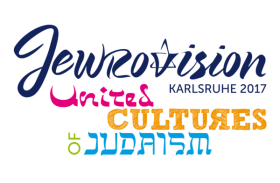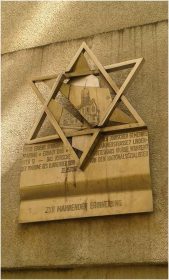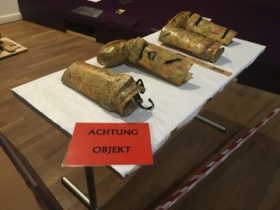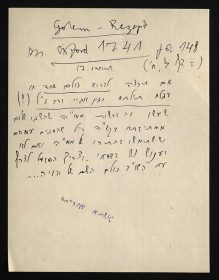 “Jewrovision”, the largest singing and dancing competition for Jewish youth in Europe, will take place this year for the 16th time. Last year an audience of over 2,000 gathered at the Rose Garden Hall in Mannheim, accompanying the brilliant stage show produced by youth centers with frenetic applause. It’s hard to imagine that Jewrovision 2002 was just one of a number of evening programs at a Jewish recreational camp called Machané. Back then, at a recreational center in Bad Sobernheim (not far from Frankfurt), six groups from various cities appeared on a stage just three yards wide. Today, only 15 years later, there are 18 teams presenting their multi-media performances on enormous stages in much larger venues. An extraordinary development. → continue reading
“Jewrovision”, the largest singing and dancing competition for Jewish youth in Europe, will take place this year for the 16th time. Last year an audience of over 2,000 gathered at the Rose Garden Hall in Mannheim, accompanying the brilliant stage show produced by youth centers with frenetic applause. It’s hard to imagine that Jewrovision 2002 was just one of a number of evening programs at a Jewish recreational camp called Machané. Back then, at a recreational center in Bad Sobernheim (not far from Frankfurt), six groups from various cities appeared on a stage just three yards wide. Today, only 15 years later, there are 18 teams presenting their multi-media performances on enormous stages in much larger venues. An extraordinary development. → continue reading
“This four-minute performance means three to four months of training”
Interactive Tracking in Berlin’s Spandau District — Attempt Nr. 1!

Commemorative plaque for the Spandau congregation’s first synagogue, which fell victim to the November 1938 Pogrom; photo: Jewish Museum Berlin
Spandau. Sixteen youths are carefully studying a memorial plaque in a building entryway. Interested young people with iPads in their hands are having an animated discussion on the streets of the old quarter. We’re talking about schoolchildren from the 9th grade at B. Traven Upper School tracing locations of Jewish life. They’re testing our online portal “Topography of Jewish Life in Germany,” which pools information on this subject for the first time and depicts it on an interactive map (our colleague Dana Müller has already reported on it here on the blog).
In the portal, the teenagers can also upload their own writing, photographs, and videos of places they discovered. They’re enthusiastically testing more functions, navigating by means of the digital map through the Jewish parts of Spandau’s historic district, clicking on apartments, reading texts, contemplating pictures, and relentlessly asking questions. Orientation is not an issue for them. So they make a lot of discoveries, for instance that the building that today houses a bank used to be a well-known “Jewish department store,” the Sternberg Department Store. They’re actually getting passers-by involved just by sharing their enthusiasm. At the end they ask us, the museum’s educators and project developers, to offer another such workshop again soon.

Sparkasse Bank in Spandau’s historic district, once the M. K. Sternberg Department Store, and commemorative plaque for Julius Sternberg at the entrance to the Sparkasse Bank; photos: Jewish Museum Berlin
That’s how it was.
Well — that’s how we would have liked it to go the first time we tried out how to combine the online portal successfully with our mobile museum on.tour — The Jewish Museum Berlin Tours Schools (more about on.tour on our website). → continue reading
Achtung GOLEM!

Golem Costume for Death, Destruction, and Detroit II at the Schaubühne Berlin, 1987. Directed by Robert Wilson; Lender: The Jewish Museum, New York
The Golem is brought to life from inanimate material, as is the exhibition we are dedicating to him. Up until the opening on September 22, many days will be spent building, painting, felting, typesetting, printing, writing, cutting, hanging and pouring. For the celebratory opening, we have invited as our special guest, a robot who will greet the public.
But up until that moment, there is still a lot to be done. All of the objects and works of art have already arrived in Berlin. For example, the smallest item (14.5 x 11 cm), which is roughly the size of a post-it. On this piece of paper, Gershom Scholem (1897–1982), the scholar of Jewish mysticism, noted the beginning of the so-called “Golem Recipe,” which he had discovered in a medieval manuscript during his research at Oxford. → continue reading

